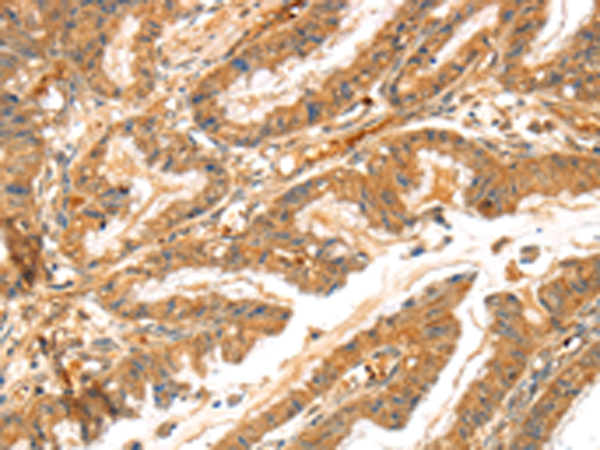

| WB | 咨询技术 | Human,Mouse,Rat |
| IF | 咨询技术 | Human,Mouse,Rat |
| IHC | 1/25-1/100 | Human,Mouse,Rat |
| ICC | 技术咨询 | Human,Mouse,Rat |
| FCM | 咨询技术 | Human,Mouse,Rat |
| Elisa | 1/1000-1/2000 | Human,Mouse,Rat |
| WB Predicted band size | 66 kDa |
| Host/Isotype | Rabbit IgG |
| Antibody Type | Primary antibody |
| Storage | Store at 4°C short term. Aliquot and store at -20°C long term. Avoid freeze/thaw cycles. |
| Species Reactivity | Human |
| Immunogen | Synthetic peptide of human LPP |
| Formulation | Purified antibody in PBS with 0.05% sodium azide and 50% glycerol. |
+ +
以下是关于LPP抗体的3篇代表性文献示例(内容为示例性概括,具体文献请以实际数据库检索结果为准):
---
1. **文献名称**: "Lipoma Preferred Partner (LPP) as a regulator of cell migration in cancer metastasis"
**作者**: Petit, V., et al.
**摘要**: 该研究探讨了LPP蛋白在肿瘤转移中的功能,开发了特异性LPP抗体用于免疫组化检测。研究发现LPP通过调节细胞黏附复合物与肌动蛋白细胞骨架的相互作用促进癌细胞迁移,抗体验证了其在多种癌细胞系中的高表达。
---
2. **文献名称**: "Characterization of monoclonal antibodies against LPP for studying focal adhesion dynamics"
**作者**: Smith, J.R., & Glukhova, M.A.
**摘要**: 研究团队制备了针对LPP不同结构域的单克隆抗体,验证了其在免疫荧光和Western blot中的特异性。结果显示LPP在成纤维细胞迁移过程中富集于黏着斑,抗体成功用于动态观察黏着斑重塑过程。
---
3. **文献名称**: "LPP expression in smooth muscle cells: Insights from antibody-based profiling"
**作者**: Tanaka, K., et al.
**摘要**: 利用LPP抗体分析血管平滑肌细胞中LPP的亚细胞定位,发现其与zyxin共定位,提示二者协同参与机械应力响应。研究为动脉粥样硬化中LPP的功能提供了抗体检测层面的证据。
---
如需具体文献,建议通过PubMed或Google Scholar检索关键词“LPP antibody”“Lipoma Preferred Partner antibody”获取最新研究。
LPP (LIM domain-containing preferred translocation partner in lipoma) is a protein encoded by the LPP gene, initially identified due to its involvement in chromosomal translocations in benign mesenchymal tumors, particularly lipomas. It belongs to the zyxin family of proteins, characterized by LIM domains that mediate protein-protein interactions and focal adhesion localization. LPP plays roles in cell adhesion, migration, and transcriptional regulation by shuttling between the cytoplasm and nucleus. It interacts with cytoskeletal components and signaling molecules, influencing pathways like TGF-β and Hippo, which are critical in cancer progression and metastasis.
LPP antibodies are essential tools for studying its expression, localization, and function in physiological and pathological contexts. In research, these antibodies help detect LPP overexpression or aberrant localization in cancers, including sarcoma, breast, and ovarian cancers, where LPP may act as an oncogene or tumor suppressor depending on context. They also aid in investigating LPP’s role in tumorigenesis through chromosomal rearrangements, such as the recurrent t(3;12) translocation forming the HMGA2-LPP fusion gene in lipomas. Clinically, LPP antibodies have potential diagnostic utility in identifying translocation-driven tumors or monitoring metastasis-related pathways. Commercial LPP antibodies are typically validated for techniques like Western blot, immunohistochemistry, and immunofluorescence, enabling multifaceted exploration of its dual roles in cell motility and gene regulation.
×